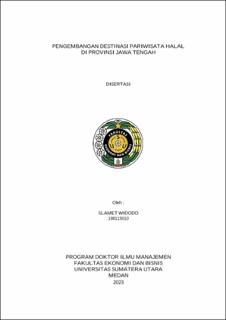| dc.description.abstract | Tourism is one of the forces of economic development in the service business sector that is growing rapidly, but until now it is still difficult to meet the basic needs of Muslim tourists, this needs a solution. The development of Halal Tourism is one of the solutions. Halal Tourism is for all tourists, Muslim and non- Muslim. This study aims to find the best holistic model to increase destination loyalty, also to find out what factors affect the development of halal tourism destinations in Central Java. This study also analyzes the direct and indirect effects of variables, namely perceived halal quality, customer engagement, destination halal authenticity congruence and experiential quality which lead to increased destination loyalty. This study also explains how the level of destination halal authenticity congruence plays a role in shaping tourist loyalty to halal tourism destinations in Central Java Province. Novelty variables will be used to evaluate the extent to which halal destination congruence and authenticity contribute to new experiences that can attract tourists. Increasing the level of visitor satisfaction with halal tourist destinations in Central Java Province can lead to increased visitor loyalty, the perception of the level of halal quality in tourist destinations can affect tourist interest in visiting Central Java tourist destinations, the level of visitor involvement can be reflected in their participation in the activities offered by tourist destinations, the quality of positive experiences can increase tourist visits to destinations, and the level of conformity of halal authenticity of destinations with halal values and practices can affect Central Java halal tourist destinations as appropriate and authentic halal tourist destinations. Sampling using probability sampling technique in several halal tourist destinations in Central Java including Borobudur Temple, Prambanan Temple, Merapi Merbabu Nature Tourism, Old Town Semarang and Solo Kasunanan Palace. This study used 385 respondents. Hypothesis testing with a structural equation model using the SmartPLS model. This study has 16 hypotheses, 3 hypotheses are rejected, namely: 1) Customer Engagement has no significant effect on Destination Loyalty, 2) Customer Engagement has no significant effect on Experiential Quality, and 3) Customer Engagement has no significant effect on Destination Loyalty through Experiential Quality. | en_US |





